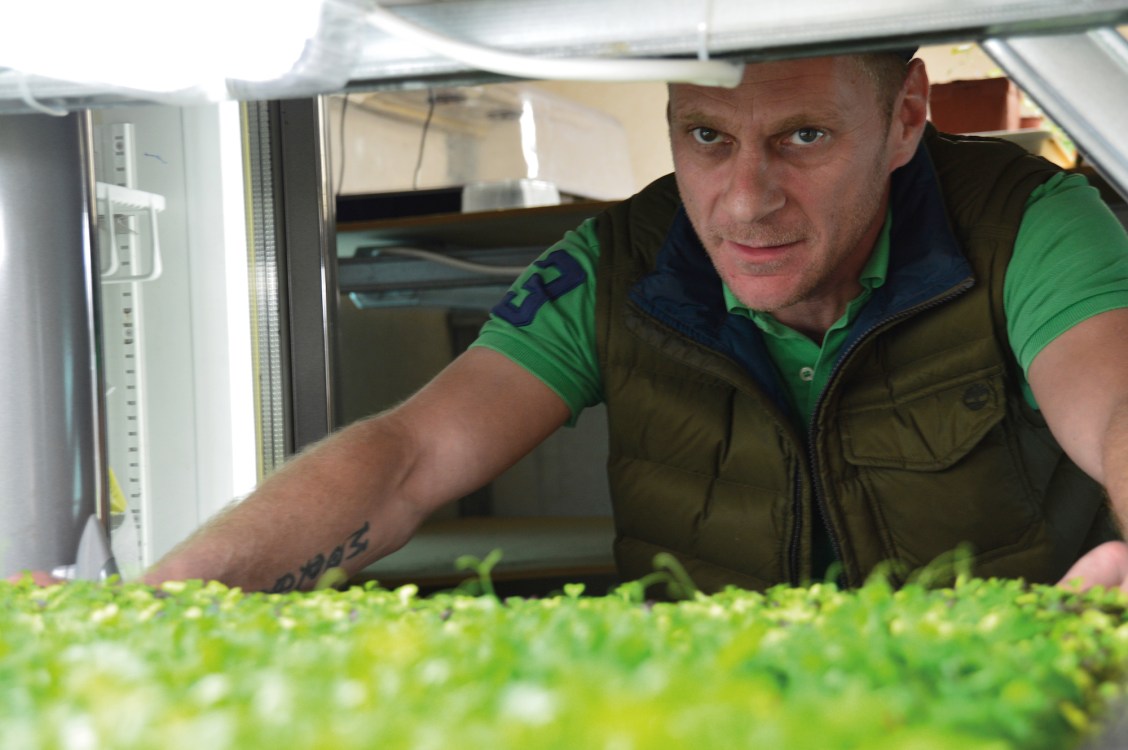Microgreens are a big trend in haute cuisine, but few know these small shoots full of life
Coming up at three to 10 centimetres, they can be sweet, spicy, bitter or mild. The vegetable seedlings incubated and harvested still in their initial growing stage — when they have the most nutrients and are rich in vitamins, amino acids, enzymes, chlorophyll and antioxidants — are highly versatile and have long been a fixture in gastronomic creations from top chefs.
While they often work as mere garnish, the truth is a growing number of studies attest to their countless health benefits. In the Algarve, a pair of local British residents recently ventured into the production of these microgreens, looking to “change mentalities” about their use. Besides winning over the national market, their goal is to “promote them as a main course.”

Anthony Price, 43 years old, a computer technician from Manchester, moved to the Algarve almost a decade ago. Tired of the challenges from a life dedicated to computers, he decided to turn an old hobby into his main job. The passion for plants was always there but when he discovered the organic market for microgreens, he quickly realized it was “the perfect concept” he was looking for, and decided to replicate it in the Algarve, where there is “a huge sector to explore.”
Price bought a farm in Almancil and named his business Tiny Farm Algarve. Here, the small vegetables grow in a controlled greenhouse environment, where everything is meticulously calculated: from temperature and humidity to the ecologic sprinkling system and the light the seeds receive.

The first experiments with these small plants began around a year ago, and currently the company has already put on the market two-dozen varieties, such as sweet pea, radishes, red mustard, broccoli and coriander shoots, among others.

The company’s sustainable and cemented success comes mainly from supplying this mini-produce to renowned restaurants and hotels in the region. Tiny Farm’s strategy is to offer samples of their product to more chefs, since “tasting is the best way to test the freshness and quality of our small vegetables, which are 100% biologic,” says the founder.
But Anthony Price is not alone in this mission to expand the business, thanks to help from his stepfather, Steven Weatherby. Both explained their goal wasn’t just to dominate the production of microgreens in the region and conquer the national market, but also to “show that it’s possible to eat them as a main course, rich in protein and taste.”
“It’s a diet with countless health benefits. There are studies that show the benefits of eating microgreens, especially to fight diseases such as diabetes or cancer,” shares Weatherby, who has first-hand experience of the rewards of this diet as a diabetic patient.
Thanks to their youth and tenderness, the small sprouts have high levels of concentrated energy and a unique and intense flavour. “All the nutrients a plant requires to produce the entire life of fruit and vegetables are developed in this first growing stage, which is why they are so nutritious. There’s a concentration of vitamins, antioxidants and carotenoids two to four times over that of ripe plants,” which “helps keep the body and immune system healthy,” they explain. To ensure all their nutritious value, Tiny Farm recommends that you serve them raw and never cooked.

Whatever the small plant, the process always beings with importing the seeds from the United Kingdom, which, depending on the species, can take between 7 — 30 days to reach the ideal harvesting size. “Almost everything we produce is reserved. These are orders with previously set deadlines.” With the surplus production, the team prepares three types of mixed packages (micro mix), with a blend of several vegetable varieties: English, Asian and Sunshine.
Thanks to his knowledge in computer science and programming, Price even developed two apps that help him control and sell the production: Crop Plan, a type of digital work calendar with daily tasks to be performed; and Tiny Farm, an easy, quick and comfortable way of shopping for the microgreens through different mobile devices.

Plans for the future include increasing the number and quantity of species produced, points of sale, as well as organising workshops with chefs and opening the farm’s doors to schools and foodies, so they can personally learn about “the countless possible uses” of these plants.







NO COMMENT